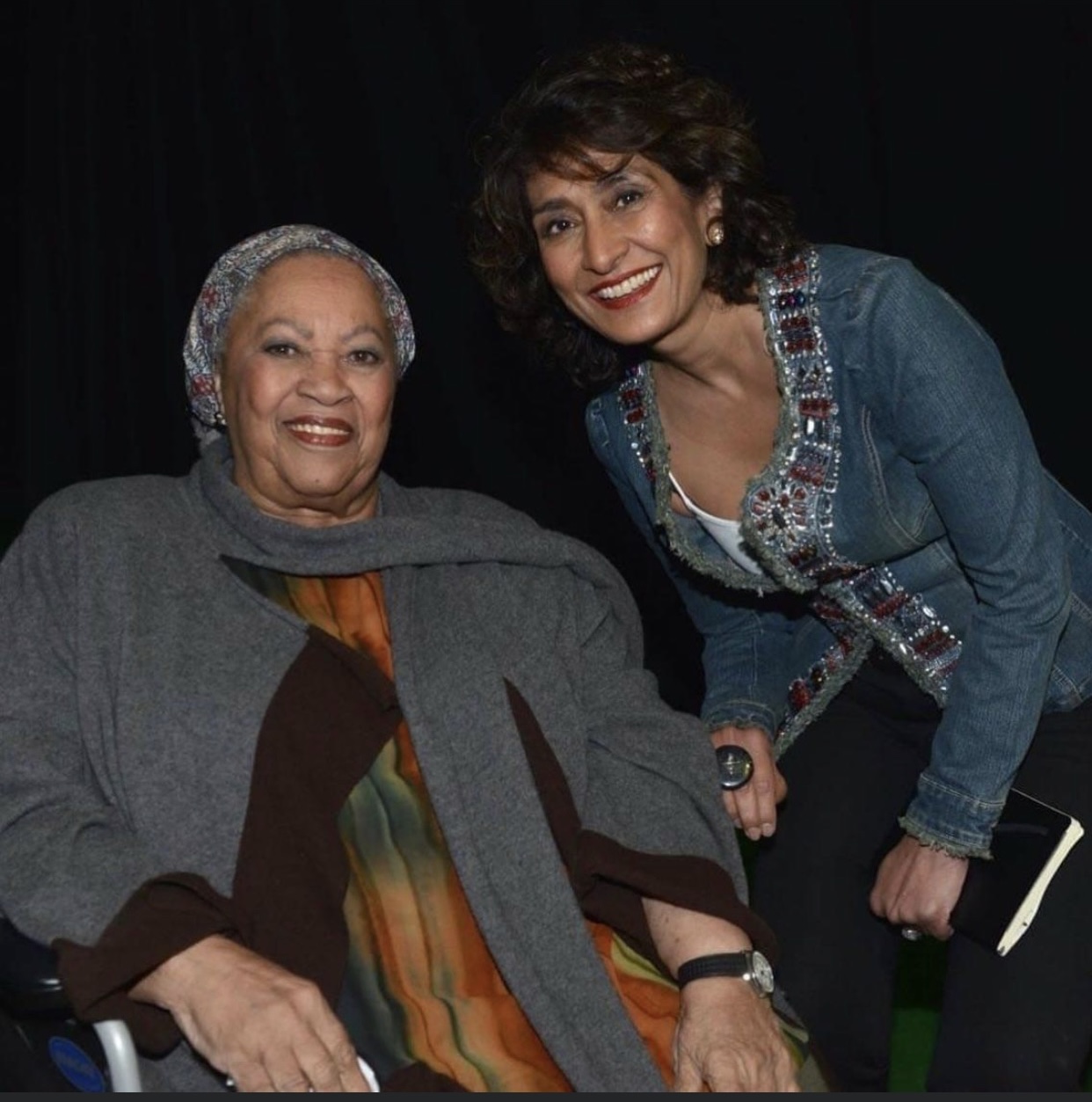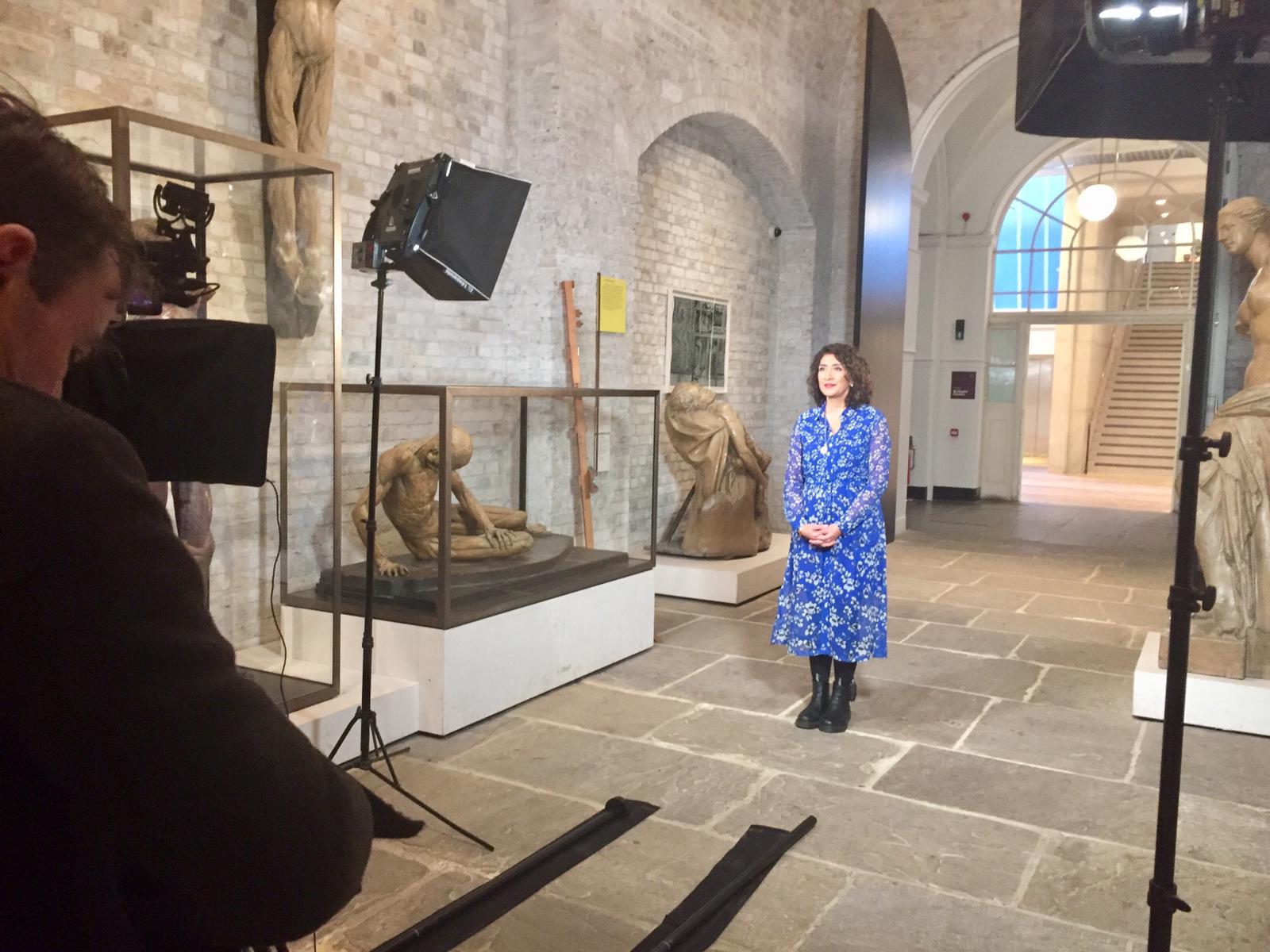Razia Iqbal: Speaking Truth to Power

By Ilene Dube
“The role of media — the reason journalism exists — is to consistently pull back the curtain and show how the government or executive or business or legislative body works…. Journalism is not a crime — it’s a job, and a really important one.”
—BBC Host Razia Iqbal and visiting lecturer/Ferris Professor of Journalism, Princeton University
Razia Iqbal’s voice used to be one of the first I heard in the morning. I had come to rely on her thorough and accurate coverage of world affairs, broadcast while many on the East Coast are brewing our morning joe or heading off to work. As anchor of BBC World Service’s Newshour — a current affairs program with 12.5 million listeners in the U.S. and millions more worldwide — she is never afraid to ask the tough questions. And to ask them again and again, rephrasing, peeling away the layers.
Through the radio waves you can almost feel her interviewees squirm.
On leave from the BBC, Iqbal is a visiting lecturer in the Humanities Council, Princeton University, serving as Ferris Professor of Journalism. Her unwavering voice, with its British accent, has been heard closer to home this spring during the panel talks she moderated, available via Zoom and YouTube.
At the time of our phone interview, Iqbal had just tested positive for COVID-19 and was experiencing flu-like symptoms and extreme fatigue — yet she insisted we carry on because she couldn’t imagine when else she might possibly fit the interview into her schedule. And she never faltered.
Residing in Palmer Square, Iqbal’s favorite part of Princeton is the campus. On her last stay in Princeton, in 2012 to interview writers Paul Auster, Toni Morrison, and Joyce Carol Oates for a TV program, she was so busy “I didn’t clock the campus,” she admits. “It’s beautiful, seen in different light and weather.”
On the mid-January day she arrived the temperature was 20 degrees. “Even though I’ve covered the New Hampshire primaries, I never experienced such a bitter cold,” she says. She was as thrilled as anyone when spring arrived.
Iqbal says she spends her spare time wandering the campus. “The reason I’m here is the University, to be teaching, so I wanted to be rooted on campus. I love the library. Being here is like living a dream.”
Born in Uganda, Iqbal and her family lived in Nairobi (where she first listened to BBC) until she was 8, then moved to London. As the only child of Asian descent in her school (her Indian-born father lived in Pakistan after the partition), she turned to the world of books for a feeling of belonging. Iqbal attended the University of East Anglia and graduated with a degree in American studies in 1985.
At an early age, Razia was inspired by the work of James Cameron, a foreign correspondent for The Guardian, and Martha Gelhorn, the American novelist, travel writer, and pioneering war correspondent (and Ernest Hemingway’s third wife).
In Iqbal’s three decades reporting from around the world, covering arts, books, and current affairs, crises have come on like a firehose. Does she miss it? “It would be disingenuous to say I didn’t wake up February 24 feeling I was missing out, not being involved in the coverage of the war on Ukraine. But that regret does not overshadow what I’ve been doing here. I’m so glad to have this opportunity to be taking time out to think differently, breathe differently, immerse myself in an academic environment.”

Iqbal with Ruth Bader Ginsburg.
The original focus for the seminar, International News: Perspectives, Prejudices and Pitfalls, had been to explore how a single event — 9/11 — caused a paradigm shift in both the global situation and journalism, but she had to pivot to fit world affairs.
Class discussions have explored the 20-year engagement in Afghanistan, and how the invasions of both Iraq and Ukraine are covered. “(Saddam) Hussein was a different president than (Volodymyr) Zelenskyy,” says Iqbal, “yet the media coverage of the two illegal invasions has been so different.”
Her goal for the course is to show that there are different perspectives on everything. “One of the reasons covering Ukraine is so striking and stark, is it allows the media to frame it as a good versus evil narrative. But it’s complicated. The point is to introduce to students’ minds that the world is not binary, though the media and world find it easy to frame it as such.”
As one who asks questions for a living, I had to ask Iqbal how she hones hers.
“Journalism is as much about listening as it is about talking,” she says. “The interviewer should really listen. The reason you ask questions is curiosity. If you’re not interested in hearing the answer, then you’re in the wrong business. Increasingly in the world we live in now, the people who hold power are trained to answer (in a way that makes them look good), so it becomes important to reframe the question. The audience makes up its mind based on the whole picture. If a politician refuses to answer or obfuscates, that becomes something for an audience to interpret.”
And then there are the politicians who deny the truth, such as Ethiopian Prime Minister Abiy Ahmed Ali about the genocide against the Tigray people of his country. “That was a hard interview,” she says of her meeting with his spokesman. “You need an enormous amount of evidence, evidence presented by the U.N. or another bona fide representative, that this is happening in this country, so when they continue to say no, they cannot hide. Journalists hold people in power accountable.”
Audiences listening to the interview “take away that the person dodged the question,” says Iqbal. “The voice tells you an awful lot. It’s so important to persist with questions, and it’s terribly revealing when you don’t get answers.”
It can sometimes turn into “well you said this” and “no I did not,” another reason listening is so important, she says. “All of these things are predicated on the interviewer knowing the subject and feeling confident. I work with a team of producers who are brilliant, they give you a briefing — as presenter you’re expected to know a huge amount about a huge number of topics.”

Toni Morrison and Iqbal.
Documented dangers to journalists run the gamut, from muzzling and kidnapping to rape and murder and threats to one’s family members. “The list is long, sadly,” Iqbal says. “The BBC has a huge challenge in places like Iran and China. BBC has filed an urgent complaint with the U.N. against Iran’s ongoing harassment of BBC News Persian journalists and their families. Journalism is not a crime — it’s a job and a really important one.”
Earlier in her career, while reporting from Sri Lanka, Iqbal found herself caught up in a gun battle and suffered shrapnel injuries. “That’s the nature of putting yourself in harm’s way,” she says. “Many of my colleagues covering the war in Ukraine are immensely brave on a daily basis. Hearing day after day of hospitals and shelters being bombed is only possible because of the people on the ground.”
After the semester ends, Iqbal plans to travel through the American South before returning to London (she’ll be back on-air August 1). Having studied Southern writers, she says, “I’m keen to see the world of William Faulkner, Zora Neal Hurston, Flannery O’Connor, Eudora Welty, and others. I interviewed Toni Morrison twice, and she would say to understand her work you have to read Faulkner.”

Filming inside the Royal Academy in London for the program “Witness History,” which Iqbal presented until 2020.

